
The birthplace of Lord Ram at Ayodhya is itself a deity and no one can claim ownership right over the sacred place by merely putting up a structure like a mosque, a counsel for 'Ram Lalla' told the Supreme Court on Wednesday.
'Ram Lalla Virajman', a deity which is one of the parties in the decades old Ramjanam Bhoomi-Babri Masjid dispute, said that 'Hindus' have always asserted and practised their right to worship at the 'Janamsthan' or birthplace.
A five-Judge bench headed by Chief Justice Ranjan Gogoi, which was hearing the title dispute case on the 9th-day, was told by senior advocate C S Vaidyanathan, counsel for the deity, that neither Nirmohi Akhara nor the Muslim parties can take benefit of legal principal of adverse possession to claim ownership right over the 2.77 acre disputed land in Ayodhya.
The doctrine of adverse possession comes into play when a person, who does not have the title of the property but can become its owner on the ground of his possession, on the ground that the original owner did not evict him for 12 years.
"Hindus have always asserted their right to worship at the birthplace and therefore it cannot be a case of adverse possession.
"Adverse possession comes into effect in the case of an alienable property and here the property, being the birthplace, assumes the character of the deity and hence becomes inalienable," Vaidyanathan told the bench also comprising Justices S A Bobde, D Y Chandrachud, Ashok Bhushan and S Abdul Nazeer.
"If the property itself is the birthplace of Lord Ram then no one claim ownership right over it by merely putting up any structures like mosque," he said.
Vaidyanathan, who advanced his argument for almost five-days, concluded his submissions on Wednesday and referred to various judgment to buttress his point that no body can take benefit of adverse possession to claim ownership rights.
Opposing the claim of Hindu body Nirmohi Akhara, which was granted one-third of the disputed land by the Allahabad high court, the counsel for the deity said: "Under the law, an idol is always considered as a perpetual minor and its 'Shabait' (devotee) or trustee cannot alienate or claim right over the property on the ground of adverse possession as against their own deity."
"The people were worshipping is good enough to show it that it was a temple and no one can demolish and put up a structure which according me is illegal and can claim the title through adverse possession," Vaidyanathan said, adding that Sunni Wakf Board was claiming the ownership right.
He said there cannot be destruction of an idol and the temple, as the birthplace of the deity cannot be 'desecrated', 'occupied' or 'traded' in the manner as is being done by the high court.
To this, the bench referred to the Ayodhaya case that an idol is the property which in this case has some "divine attributes'.
He said that even if the idol is broken or destroyed, its character remains intact, as it is considered immortal.
Vadiyanathan highlighted the primacy of the birthplace of Lord Ram by giving a hypothetical illustration and said, if an ordinary temple is getting submerged due to the construction of a dam, then devotees can shift the idol to other place but here the case is different and such actions may face a backlash of the devotees because the birthplace itself is a deity and can't be shifted.
"Ram Janambhoomi cannot be shifted to some other place. It is unique and the sanctity and the dignity are attached to this very place," he contended.
The bench asked Vaidyanathan to explain or refer to some case judgements on whether Church is considered as a juristic person and if yes, which part--the building or the congregation.
Vaidyanathan refers to some judgements said that to the best of his knowing Church cannot be considered as a juristic person.
Referring to the high court verdict of 2010, the senior lawyer said that it was found that neither the Sunni Wakf Board was registered nor the disputed property was in its name and one of the judges, in the verdict, even found interpolation of the revenue records.
"Three judges of the High Court have given their finding and most of the findings are in my favour. Therefore, the court should not interfere with those findings which are in my favour," he said while concluding his arguments.
After the counsel for deity concluded the arguments, as many as two senior lawyers appearing for Hindu bodies were found to ill-prepared by the court which asked them to collate all relevant records and documents in a systematic maner, which they want to rely upon.
The bench, then asked senior advocate Ranjit Kumar, appearing for one of the original litigants Gopal Singh Visharad, who is seeking enforcement of his right to worship at the disputed place.
Kumar said a law suit was filed way back in 1950 by his father Visharad, who used to pray at the birth place and after his death in 1986, his son Rajendra Singh has been exercising his right to 'Shabaitship' (worshipper).
The hearing will resume on Thursday.
Fourteen appeals have been filed in the apex court against the 2010 Allahabad High Court judgment, delivered in four civil suits, that the 2.77-acre land in Ayodhya be partitioned equally among the three parties -- the Sunni Waqf Board, the Nirmohi Akhara and Ram Lalla.
Babri Masjid was demolished by right-wing activists on December 6, 1992 in Ayodhya, leading to the protracted legal battle.
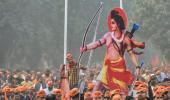
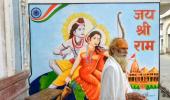
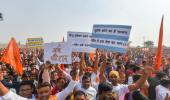
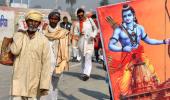
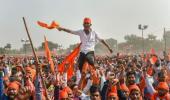







 © 2025
© 2025